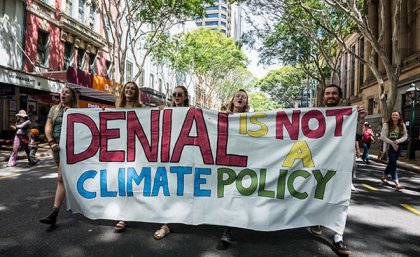
Have you ever let out an exasperated sigh when you read about some political leaders blatantly refuting the existence of climate change? As disappointing as it can be when reading or hearing about it, we often tend to forget about it and continue our routines of sleep, work, eat and participate in the endless cycle of consumption until we stumble on another similar news article. However, these beliefs or rather the disbelief in climate change, or more specifically, lack of environmental concerns can be alarming if it comes from political leaders, especially those in power in the United States.
A quick google search makes it clear that the United States is most responsible when it comes to climate change in today's world. Imagine how much more clean air you could breathe if the United States (or maybe the one political leader we all have in mind upon reading this) accepted global environmental concerns and contributed a little more towards saving this planet? Some of us may also wonder, do these few odd political leaders really care about the world that future generations will grow up in?
In light of this rather comically ironic situation, researchers at The University of Texas and Louisiana Tech University posed an interesting question: how does care for future generations explain the relationship between being politically conservative and having pro-environmental attitudes? They used concepts from Erik Erikson's stage theory to label 'care for future generations' as generativity.
They conducted two studies on American undergraduate students to seek the answer to their question, and studied three relationships: how political conservatism and generativity were related, how generativity and environmental attitudes were related, and how political conservatism and environmental attitudes were related.
It was found that conservatism was associated with lower pro-environmental attitudes and unexpectedly, with higher generativity and higher generativity was associated with more pro-environmental attitudes but oddly enough, political conservatism was indirectly related to more pro-environmental attitudes. In simpler terms, the relationship between conservatism and environmental attitudes was unexpectedly positively affected by generativity.
The researchers also explored explanations for the relationships that were opposite to what they predicted. An explanation of why conservatism may be linked to higher generativity is that conservatives may emphasize moral foundations that focus on the overall well-being of society as compared to liberals who focus on individual rights for moral foundations. An alternate explanation can pose that conservatives tend to be more conscientious. To explain the negative relationship between political conservatism and pro-environmental attitudes despite being positively related with generativity, it may be that conservatives associate environmental concerns with being more on the left of the political spectrum. Their concern for future generations may not extend to environmental concerns.
Taking a step back, the authors of this discussed article explore the issue of the political nature of responses to concerning environmental problems. The in turn, implies a specific problem that Conservatives in the United States have less support for environmental support which have concerning implications of the Conservatives being in positions of power. The effects of this problem are reflected in governments making decisions to tackle climate change and pollution, which pose widely know threats to life and health. Voters need to be made informed that their political choices can have drastic effects when it comes to policy making regarding the environment, and even if political leaders care about future generations, that might not necessarily extend to ensuring clean air to breathe.
A potential solution to this greater problem lies in the observation that conservatism relates to greater generativity. Political leaders with more tendency towards the right should be made aware of the impacts of climate change and deteriorating natural resources on the health and well-being of the youth today and of future generations. The benefits of recognising that caring for future generations includes caring for the environment they grow up in, can be translated to wider measures for tackling climate change, regardless of the political party or government-in-power's ideology.
Next time you come across someone who does not believe in climate change, ask them whether they think whether it is necessary to have a clean and healthy environment for their future generations to grow up in.

Barnett, M. D., Archuleta, W. P., & Cantu, C. (2019). Politics, concern for future generations, and the environment: Generativity mediates political conservatism and environmental attitudes. Journal of Applied Social Psychology, 49(10), 647-654. doi:10.1111/jasp.12624
Irfan, U. (2019). Why the US bears the most responsibility for climate change, in one chart. Vox. Retrieved from https://www.vox.com/energy-and-environment/2019/4/24/18512804/climate-change-united-states-china-emissions
No comments:
Post a Comment